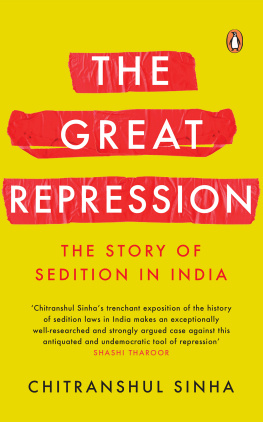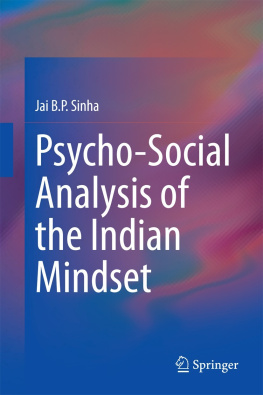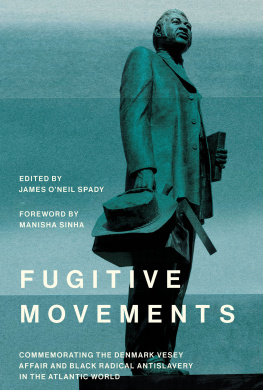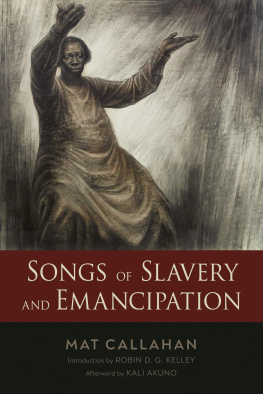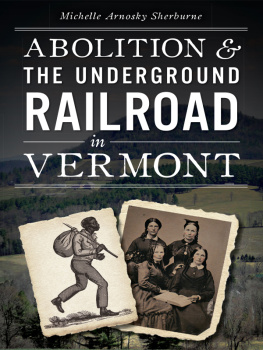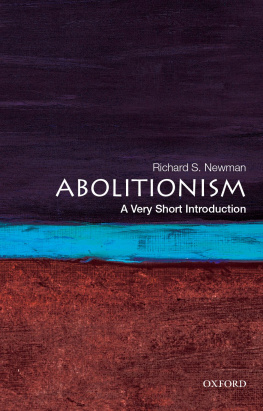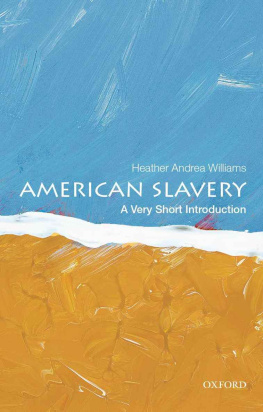THE SLAVES CAUSE
THE SLAVES CAUSE
THE SLAVES CAUSE
A History of Abolition
Manisha Sinha
Yale
UNIVERSITY PRESS
New Haven & London
Published with assistance from the Annie Burr Lewis Fund.
Published with assistance from the foundation established in memory of James Wesley Cooper of the Class of 1865, Yale College.
Copyright 2016 by Manisha Sinha. All rights reserved. This book may not be reproduced, in whole or in part, including illustrations, in any form (beyond that copying permitted by Sections 107 and 108 of the U.S. Copyright Law and except by reviewers for the public press), without written permission from the publishers.
Yale University Press books may be purchased in quantity for educational, business, or promotional use. For information, please e-mail (U.K. office).
Set in Electra and Trajan Pro types by Newgen North America.
Printed in the United States of America.
Library of Congress Control Number: 2015948091
ISBN 978-0-300-18137-1 (cloth : alk. paper)
A catalogue record for this book is available from the British Library.
This paper meets the requirements of ANSI/NISO Z39.481992 (Permanence of Paper).
10 9 8 7 6 5 4 3 2 1
For Karsten,
My German Philosopher
But while endowing her imaginary heroes with every perfection under the sun, Jo was discovering a live hero, who interested her in spite of many human imperfections.... There were lines upon his forehead, but Time seemed to have touched him gently, remembering how kind he was to others.
Louisa May Alcott, Little Women (1868)
CONTENTS
ACKNOWLEDGMENTS
This book has taken me ten years to write, and my debts are numerous. Perhaps the largest is the one I owe to my research home away from home, the American Antiquarian Society, where this project began during a yearlong National Endowment for the Humanities fellowship. I have done the bulk of the research for this book there, enjoying the luxury of reading abolitionist newspapers in print and the excitement of coming across pamphlets personally signed and donated to the society by the black abolitionist Martin Delany. I thank the AAS community, for whom I became a fixture: Joanne Chaison, Ellen Dunlap, Paul Erickson, Babette Gehnrich, John Keenum, Marie Lamoureux, Elizabeth Pope, Caroline Sloat, and the numerous staff members who assisted me. Jaclyn Penny generously reproduced many of the illustrations that grace this book. I am thrilled that President Barack Obama has recognized this national treasure with a National Humanities Medal. I also thank the librarians and staff at the Boston Public Library, the Library Company of Philadelphia, the Library of Congress, the Historical Society of Pennsylvania, the New-York Historical Society, the Schomburg Center for Research in Black Culture of the New York Public Library, the Massachusetts Historical Society, the Rare Book and Manuscript division of Butler Library at Columbia University, the Houghton and Widener Libraries at Harvard University, and the W. E. B. Du Bois Library at the University of Massachusetts, Amherst, for their assistance. Nicole Joneic and Krystal Appiah of the Library Company of Philadelphia also provided invaluable assistance gathering images. Chris Densmore of the Friends Historical Library at Swarthmore College shared his expertise on Quaker history with me.
The Gilder Lehrman Institute of American History and its director, James Basker, who shares my passion for all things antislavery, Deborah Schwartz of the Brooklyn Historical Society, and Pamela Green of the Weeksville Heritage Center, who hired me as the lead consultant for the exhibition In Pursuit of Freedom on Brooklyns abolitionists, facilitated my research trips to New York City. Above all, I would like to thank the benefactor of many of the institutions mentioned above, Sid Lapidus. A delightful visit to his personal library of early antislavery literature was the highlight of my research.
Much of the writing of this book was done at the AAS, during a faculty fellowship year at the Charles Warren Center for Studies in American History, Harvard University, and a sabbatical supported by the Howard Foundation at Brown University and the University of Massachusetts. I thank all the fellows: Daniel Carpenter, Dorothy Sue Cobble, Cornelia Dayton, Francoise Hamlin, Maartje Janse, Albrecht Koschnick, Daniel Kryder, Cindy Lobel, Christopher Lukasik, Lisa Materson, Timothy McCarthy, Lisa McGirr, Lisa Tetrault, and Susan Ware. Dan Carpenters tremendous project of digitizing all known abolitionist petitions will long prove a boon to scholars of antislavery. I thank Nicole Topich for sending the entire database to me and Jennifer Fauxsmith of the Massachusetts Archives for permission to reprint a petition gratis.
I want to acknowledge my professional home of nearly twenty years, the University of Massachusetts, Amherst, where this book was conceived and written. I cannot possibly name them all, but my colleagues in the Afro-American; American; Women, Gender, and Sexuality Studies; and History Departments deserve special mention. I thank all those who attended my presentations at the Five Colleges History Seminars, one at the start and the other at the end of this book project: Chris Appy, Joyce Berkman, Joye Bowman, David Glassberg, Jennifer Heuer, John Higginson, Margaret Hunt, Bruce Laurie, Laura Lovett, Lynda Morgan, Kym Morrison, Brian Ogilvie, Mary Renda, Leonard Richards, James Smethurst, Susan Tracy, Robert Weir, and all the graduate students. Neal Salisburys comments at the first presentation and Frank Couvaress at the last were much appreciated. The Massachusetts Society of Professors and the College of Humanities and Fine Arts provided me with a generous budget for acquiring images.
I am particularly grateful to those who took the time to read my manuscript when it was well over a thousand pages, truly a labor of friendship: Eric Foner, who has always been there for me and who invited me to contribute to his anthology Our Lincoln, and Graham Russell Hodges and James Sidbury, both of whose work on early African American history I greatly admire. All three gave me excellent advice on how to trim the manuscript and asked good questions. John Stauffer has been a superb coadjutor, as the abolitionists would say. I value his unstinting support.
I thank other scholars who supported me, sent me their work, solicited my input, commented on parts of the book at conferences, and invited me for talks: A. J. (Amy) Aiseirithe, Erica Ball, Edward Baptist, Ira Berlin, Robin Blackburn, David Blight, Evelyn Brooks Higginbotham, Steve Bullock, Chris Cameron, the late Stephanie Camp, Erik Chaput, Robert Churchill, Mathew Clavin, A. Glenn Crothers, David Brion Davis, Andrew Delbanco, Allison Efford, Daniel Feller, Sharla Fett, Barbara Fields, Franois Furstenberg, Sarah Gronningsater, Leslie Harris, Stanley Harrold, Mischa Honeck, Martha Jones, Prithi Kanakamedala, Jeffrey Kerr-Ritchie, Ethan Kytle, Drew McCoy, Richard Newman, James Oakes, John Quinn, Patrick Rael, Stacey Robertson, the late Christopher Schmidt-Nowara, David Smith, Mitchell Snay, Elizabeth Strodeur-Pryor, Kristin Waters, and Michael West. Sam Haselby and Adam Rothman made me shorten the title. I thank my current and former graduate students: Sean Alexander, Kabria Baumgartner, Julia Bernier, Emahunn Campbell, Alex Carter, Nneka Dennie, Crystal Donkor, Vanessa Fabien, David Goldberg, Erin Judge, Michael Landis, Christopher Lehman, David Lucander, Zebulon Miletsky, Johanna Ortner, Ousmane Power-Greene, Rita Reynolds, David Swiderski, Crystal Webster, Robert Williams, and Peter Wirzbicki.
I owe a lot to my agent extraordinaire, Sandra Dijkstra, and to John Donatich, the director of Yale University Press, for acquiring this book. The advice of my wonderful editor, Christopher Rogers, was always stellar and consistently encouraging. It has been a genuine pleasure to work with him. Erica Hanson, Susan Laity, and Lawrence Kenney expertly shepherded the manuscript into production.
Next page

